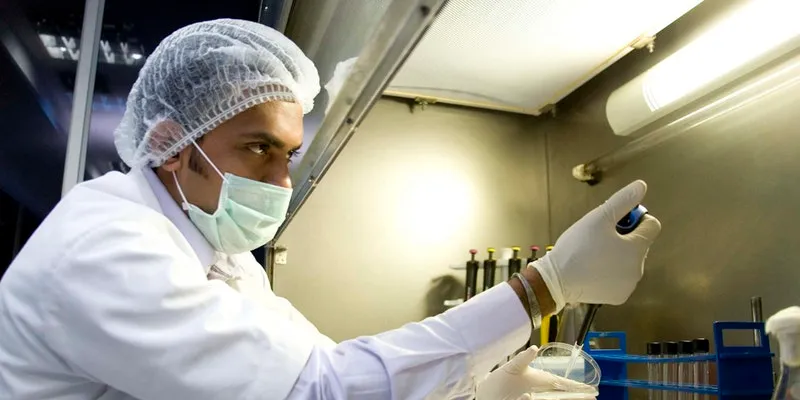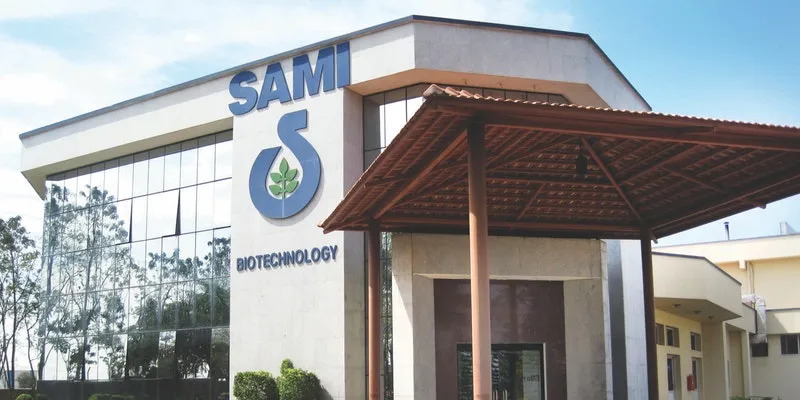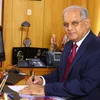With Rs 67 in his pocket, this pharma graduate went on to build a Rs 1,250 Cr revenue herbal extracts company
Started by Muhammed Majeed, Sami-Sabinsa is a health science company which deals with nutraceuticals, cosmeceuticals, standardised herbal extracts, fine chemicals, specialty chemicals, and probiotics.
In 1975, pharma graduate Muhammed Majeed was on a plane to the United States. Born and raised in Kollam, Kerala, Majeed had only $8 in his pocket when he emigrated. In those days, $8 was approximately Rs 67.
But far more valuable was his passion for Ayurveda, herbal extracts, clinical research, pharmacology, and nutrition.
Majeed completed his Master’s degree and PhD in Pharmacy in the US, and landed jobs at the R&D divisions of pharmaceutical giants Pfizer Inc and Carter-Wallace. Thus, began his journey in the healthcare and health science sector.
“In the late 80s, I saw Americans were beginning to take personal responsibility for their health and wellness. They were embracing the natural product industry. I saw synergy between my traditional Ayurvedic knowledge and modern scientific methods,” Majeed tells SMBStory.
Majeed realised he could venture into nutraceuticals and cosmeceuticals by developing standardised herbal extracts from Ayurvedic plants in India and creating a global market for them.
Nutraceuticals are products derived from herbal products, minerals, vitamins, and dietary substances. They are said to have physiological benefits and/or boost immunity against diseases. Cosmeceuticals are cosmetic products made from bioactive ingredients, and are said to have medical benefits.

Muhammed Majeed, Founder and Chairman, Sami-Sabinsa Group
Majeed decided to give wings to his entrepreneurial vision and started Sabinsa Corporation in the US in 1988. But this was just the first phase - the most critical part of his vision was the launch of Sami-Sabinsa Group in Bengaluru in 1991.
He started Sami Labs as the research and development (R&D) and manufacturing arm of the group, and Sabinsa as the sales and marketing wing. Through Sabinsa, ingredients from India were marketed throughout the world.
“With less than $100,000 in savings, plus lots of credit cards, the business was set in motion. Those were tough days and we had many sleepless nights because there was no one to follow in the market. The marketplace for Ayurvedic ingredients had not opened in the western world,” Majeed says.
But Majeed knew he could rely on his family. His wife became the company’s first secretary and his brother-in-law helped in packaging goods.
This laid the foundation for what would become a major company in the field of nutraceuticals, cosmeceuticals, standardised herbal extracts, fine chemicals, speciality chemicals, and probiotics.
“We supply these products as ingredients to makers of nutraceuticals and cosmeceutical products. The ingredients are used in the end product,” he says.
Today, Sami-Sabinsa Group, which currently employs over 700 people, is expecting a turnover of Rs 1,250 crore in 2019-20.
Business setup
Sami-Sabinsa’s products were from India, and Majeed had to source material and ingredients from local suppliers. Before starting his own R&D lab, Majeed would check the ingredients himself and usually found that they just about passed the quality testing.
But soon, the quality of ingredients started to vary.
“Some degree of natural variation was acceptable. But the turmeric we received, which was supposed to be yellow-orange in colour, was instead brown. We realised the supplier was fooling us,” he recalls.
Such a big difference in colour was unacceptable to Majeed. He felt he could overcome this by setting up an R&D lab to scrutinise the supply. This gave birth to Sami Labs, which went on to produce all the items Sabinsa supplies worldwide.
The setup in Bengaluru has helped the group with extensive research support for its products. Process development and product innovation are the focus of the R&D efforts in the company’s research facilities. This is done through R&D in phytochemistry, synthetic chemistry, biochemistry, tissue culture, and plant biotechnology.
This helps the company develop novel approaches to retain the biological activity of natural ingredients while simultaneously addressing formulation challenges and product safety criteria.

A scientist in Sami Labs
“We put resources into sharing the body of science behind our products in a variety of ways, from scientific meetings which we call ‘Sabinsa on Wheels’, to books, white papers, published studies, and a large number of articles in nutraceutical and cosmetic trade publications describing the health benefits of our products,” Majeed says.
Sami-Sabinsa also supplies finished dosage forms in capsules, tablets and bi-layer tablets in bulk or in bottles. Curcumin C3 Complex, LactoSpore, Gugulipid, BioPerine, , and Saberry are some of its ingredient brands that are used in food, beverage, nutrition, personal care and cosmetic products.
“We do not consider our ingredients as generics or commodities, especially after the tests, studies, and the research we do. The products are priced competitively for the science and benefit they offer. Consistency is also something our customers look for. They do not mind the price they have to pay for this,” he says.
Learnings and the way forward
Things were not always smooth for Majeed even after setting up his R&D division. In the early 2000s, he faced a shortage of supply of a key ingredient (he doesn’t disclose its name), and this happened at a crucial time.
His customers were looking forward to a major product launch, and needed the ingredient. Unfavourable weather phenomena like droughts and floods in India crippled the supply of the ingredient.
“We lost a lot of customers due to these circumstances. But we learned a great deal about strengthening our supply chain. We try to anticipate and deal with Mother Nature wherever possible,” he says.
Majeed believes Sami-Sabinsa doesn’t have direct competition, due to its pioneering status in the field of ingredients extracted from Indian herbs.
“Other companies manufacturing active nutraceutical ingredients focus only on a few things. For Sami-Sabinsa Group, there may not be a singular competitor which does everything we do. For example, we hardly find an Ayurvedic ingredient manufacturer also producing probiotics - something we do every day,” he explains.

A Sami biotechnology facility in Bengaluru
Sami-Sabinsa has now commenced work on building a manufacturing facility at Hassan in Karnataka. It will be an active nutraceutical ingredients manufacturing facility and cost the company Rs 200 crore.
The first phase of the plant will house a 40,000 square metre manufacturing unit, with an annual capacity of 300 tonnes. It will be functional by 2021, according to Majeed.
He hopes the new unit, when operational, will play a pivotal role in boosting his company’s exports further, doubling its revenues, and providing employment to around 400 qualified workers in Hassan.
This is part of his strategy to grow his ingredient business and focus on new and innovative products.
In light of the COVID-19 pandemic, Sami-Sabinsa has installed additional handwashing facilities and implemented increased sanitation practices across its corporate, R&D, warehouse, and manufacturing facilities worldwide, according to Majeed.
“We remain ready to respond to our customers’ requirements via phone, email, and video services. Our manufacturing facilities are operational, albeit with heightened health and safety protocols in place. We foresee no disruptions in our ability to supply vital ingredients, even with demand increasing - as it does in times of crisis,” Majeed says.
(Edited by Javed Gaihlot)










